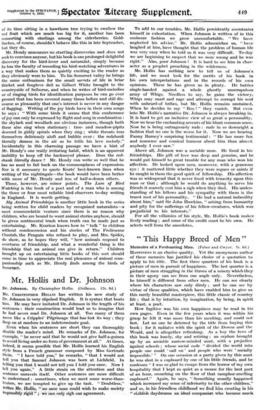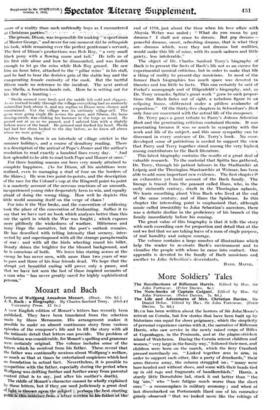" This Happy Breed of Men
Memoirs of a Foxhunting Man. (Faber and Gwyer. 7s. 6d.) HAPPINESS is an elusive quality. Yet the anonymous author of these memoirs has justified his choice of a quotation to apply to his title. The first three quarters of his book is a picture of men in pursuit of happiness. The last quarter is a picture of men struggling in the throes of a misery which they in their agony can see from one angle only. Nevertheless, he himself is different from other men. He can see clearly where his characters saw only dimly ; and he can see by virtue of those qualities, which have enabled him to give us this rarely beautiful masterpiece, this little classic of country life ; that is by intuition, by imagination, by being, in spirit at least, a poet.
How fugitive was his own happiness may be read in his own pages. Even in the few years when it was within his grasp he felt it was more than his meriting, and could not last. Let no one be deterred by the title from buying this book ; for it radiates with the spirit of the Downs and the Weald, and is altogether refreshing. As a 'boy the hero of this book was lonely, shy and retiring ; an orphan brought up by an amiable narrow-minded aunt, with a prejudice against schools ; whose social code " divided the world into people one could ' call on ' and people who were ' socially impossible.' " On one occasion at a party given by this aunt he was shut in a cupboard by one of his little friends, and he confesses " I was so glad to, escape from the horror of my own hospitality that I kept as quiet as a mouse for the best part of an hour, crouching on the floor of that camphor-smelling cupboard." Again, he says, " Something usually happened which increased my sense of inferiority to the other children," and so, in his friendless childhood we find him creating in his " etildish daydreams an ideal companion who became much more of a reality than such unfriendly boys as I encountered at. Christmas, parties:!'., - • - -
„ The groorri; Dixon; wasiesponsible formaking "a sportsman of Master George," and IneVer ter one moment did he relinquish his task, while remaining ever the perfect gentleman's servant. The first of Dixon's productions was Rob Roy, " a very small black pony with a flowing mane and tail." He tells us of his first ride alone and how he dismounted, and was foolish enough to let go the reins while Rob Roy grazed. He saw him an hour later, attached to the " pillar reins" in his stall, and he had to bear the derisive grin of the stable boy and the exasperating female curiosity of the cook. But the tactful Dixon made no reference to the incident. The next arrival was Sheila, a fourteen-hands cob. Here he is setting out for his first day's hunting :-
"Sheila seemed very fresh and the saddle felt cold and slippery. As we trotted briskly through the village everything had an austerely unfamiliar look about it, and my replies to Dixon were clumsy and constrained. Yet the village was its . ordinary- village-rel.f. The geese were going -single file across the green, and Sibson, the lame shoeing-smith, was clinking his hammer in the forge as usual. He peered out at us as we passed, and I saluted him with a slightly forlorn wave of the hand: He grinned and ducked his head. Sheila had had her shoes looked to the day before, so he knew all about where we were going."
After Sheila there is an interlude of village cricket in the
summer hOlidays, and a course of desultory reading. There is a deSeription of the arrivarof Pope's Ifonterandilie author's
resolution to read exactly a hundred lines every day. " And hove splendid to be able to read both Pope and Homer at once." For three hunting seasons our hero very nearly attained to complete happiness. (As for Dixon, all his ainbitions Were realized, even to managing a stud of four on the borders of the Shires.). He won two point-to-points, and the description of the race for the Colonel's cup at the Ringwell point-te-point is a masterly account of the nervous reactions of an uncouth, inexperienced young riderdesperately keen to win, and equally afraid of doing the wrong thing. 'HoW well he depicts this little world amusing itself on the verge of chaos !
For into it the War broke, and the convention of soldiering took the place of the convention of foxhunting. Suffice it to say that we have met no book which analyses better than this one the spirit in which the War was fought which exposes more pitilessly the wickedness of warfare. Bitterness and irony tinge the narrative, but the poet's outlook remains.
He has described with telling intensity that scenery, -inter- sected by and superimposed with all the strange paraphernalia of war : and with all the birds wheeling round his billet.
Beauty shines the brighter for the bleared background, and he is conscious of both. We leave him staring across at the
enemy he has never seen,. with more than two years of war to pass and three of his four friends dead. We hope that the abrupt :yet beautiful ending will prove only a pause, and that we have not seen" the last of these inspired memoirs of a man who has never greatly eared for highly sophisticated
persona." •























































 Previous page
Previous page